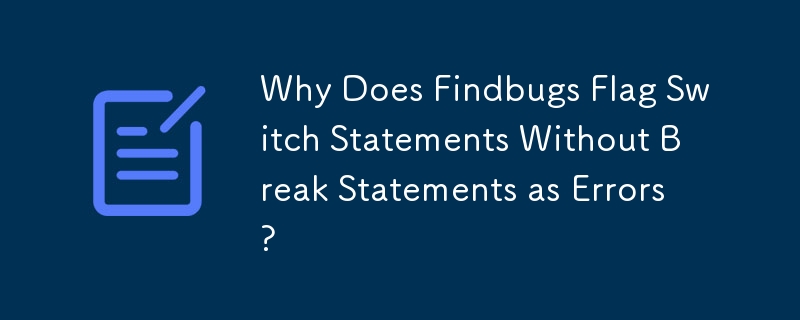Home >Java >javaTutorial >Why Does Findbugs Flag Switch Statements Without Break Statements as Errors?
Why Does Findbugs Flag Switch Statements Without Break Statements as Errors?
- Patricia ArquetteOriginal
- 2024-11-02 05:26:02425browse

Switch Statements Without Break: Understanding Potential Errors
In Java programming, a switch statement allows efficient execution of different code blocks based on provided criteria. However, the absence of break statements can lead to unexpected behavior and potential errors, as detected by tools like Findbugs.
The Issue:
Consider the following switch statement:
switch (x) {
case 0:
// code
case 1:
// code
case 2:
// code
}
Without break statements, the code in each case block falls through to the next case. This means that if x is 0, all the code in case 0, 1, and 2 will be executed. This behavior can be problematic, especially if the code in the subsequent cases depends on the value of x.
Findbugs' Error:
Findbugs identifies the second case statement (case 1) as problematic. It flags an error because it detects that the execution may fall through to the next case without a break, potentially causing logic errors or unwanted behavior.
Intended Behavior:
A typical scenario for switch statements involves using break statements to terminate execution in each case block. This ensures that only the desired code block executes based on the provided criteria.
For instance, consider the following switch statement with break statements:
switch (foo) {
case 0:
doSomething();
break;
case 1:
doSomethingElse();
break;
default:
doSomeOtherThing();
break;
}
In this example, if foo is 0, only doSomething() will execute. If foo is 1, doSomethingElse() will execute. If foo is any other value, doSomeOtherThing() will execute.
Handling Multiple Cases Without Intervening Code:
There are instances where multiple cases in a row may not require intervening code blocks. For example:
switch (foo) {
case 0:
case 1:
doSomething();
break;
case 2:
doSomethingElse();
break;
default:
doSomeOtherThing();
break;
}
In this scenario, we intend to execute doSomething() if foo is 0 or 1. Tools like Findbugs generally do not flag this as a potential error because there is no code in the case 0 block that precedes the case 1 block.
The above is the detailed content of Why Does Findbugs Flag Switch Statements Without Break Statements as Errors?. For more information, please follow other related articles on the PHP Chinese website!

